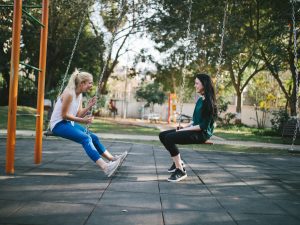Imagine walking into a stadium filled with your entire student body. The host says, “Choose to sit where you like.” You know what they mean, so you scramble to your phone, text your friends, and race to find them. The people you sit next to, those are your people—your community.
Community involves a group of people unified or focused on one thing. For example, we can refer to our neighbourhood, city, or town with the word “community.” We can also decipher between communities based on ethnicity, religion, interests, or professions (environmentalists, educators, etc.). Some communities recognize themselves as “clubs,” “houses,” “teams,” or “fans.”
So, what’s the point of building a community in university? Here are three reasons why I believe it’s important.
Academic support
When I first began university, my professors encouraged us to connect with three students in our classroom. That meant taking down their name, phone number, and email. Our professors already knew we’d need a tiny community to survive the class. We’d need someone to call if we missed a class and needed to know about the homework. We’d need help understanding a term if we couldn’t talk to the professor, and we’d need someone to freak out with when we were way in over our heads.
While they can’t do your homework, friends totally understand what you’re going through and can sympathize with the challenges and the experience. Plus, study parties and much-needed group coffee breaks are essential to have fun and build connections.
Relational Growth
There’s a popular theme amongst university students of trying to find “their way,” trying to decide “where they fit” and “what works for them.” Identity discovery sums up the season of university. It’s a time of many decisions, including major, career path, faith, style, and friends.
With a community, you skip past confusion and head into the realm of possibilities. For example, my two first friends in university couldn’t be any more different from me. One chose to pursue medical school, and the other chose law; I pursued a degree in English literature. One day, my friend pointed out the lack of promise in finding a job in literature and writing, and so I grew discouraged. However, my other friend’s sister was a newspaper columnist. She encouraged me to keep on pursuing my passion, and helped my other friend to remain open-minded about the possibilities in life. We all grew in courage that day.
In my final year of university, I met up with a first year student on campus. She had just come back from the counsellor’s office, as she was battling suicidal thoughts. I had no idea what to do, so we prayed, and connected with the first-year girls I knew. They booked a study room, and invited her to join, as they attended the same classes as her. We ended up grabbing milk teas and burgers, and helped her study for her midterm that night. On our way to the lecture hall, we sang upbeat songs to her until the classroom doors unlocked.
Over the next few days, we bonded over studies and then connected her to a Christian club on campus. We knew that there was a pastor involved with the group who could offer her additional guidance and assistance in getting mental health support. We attended the club with her, and the pastor journeyed with her as she sought to find healing from the heartache caused by loneliness and rejection. I got to create a scrapbook for her of favourite quotes, devotionals, and articles that spoke to the different experiences she shared with me. It was so fun! At the end of the year, she came to know Christ, and she now serves on the club’s worship team as a singer.
Encouragement and fellowship
One realistic part of relationships, which I discovered in university, is that they don’t all last forever, sadly! University is a time of constant change, and sometimes people head down very different paths—we can experience a lot of loss and grief in this. However, a slate of new classes, timetables, and classmates every four months brings opportunities to form new friendships in new seasons.
I formed a tight-knit community of friends in my second year that was filled with encouragement. We wanted to see each other do well in university and be happy in life. We would build each other up by reminding one another:, “You are not alone in this,” “Seasons pass,” and, “It’s possible to move forward and create awesome memories.” Being around a friend who’s committed to working on an assignment for an hour, or willing to spend the day working through their exam review while you write up a final essay, makes studying less intimidating. The encouragement helped us handle stress better, and stay motivated to work hard throughout the school year.. It also equipped me to help others in seasons of hardship.
As mentioned earlier, my program encouraged classmate friendships, and those are intimidating in the beginning. My immediate thoughts were, “Who will I sit with at lunch?” and, “My classes have 500 people and we don’t trade numbers” and “Where do I go to find solid friends?”
My advice in these situations is: attend and participate in class, don’t be afraid to join a table for lunch, and choose your friends wisely. Know that common interests (music, books, food) create bonds, some superficial and some deeper. Consider joining a club, and definitely join (or start) a campus ministry! Clubs are so much fun to be a part of; you’ll find a place to meet students, swap embarrassing stories, and learn more about your interests (environment, law, non-profit organizations—whatever they are). And campus ministries pretty much take the cake when it comes to maximizing your experience in university. It’s incredibly fun and exciting to meet like-minded people, grow spiritually, enjoy fellowship through worship and Bible studies, and hang out outside of club meetings!
One of the best decisions I made for my spiritual walk was joining Power to Change-Students. They greeted me with open arms, encouraged me to pray, trained me in sharing the gospel, and invited others to join us each week. Those of us who were involved got the benefit of receiving ongoing discipleship mixed in with engaging adventures. We ended up grabbing lunch with each other, going on mission trips together, and praying over the phone.
Experiencing fellowship on campus, with a community of believers and non-believers, changed the way I engaged with people in class, at work, and at church, and improved my relationship with God. I learned how to stay others-focused, handle various opinions with an open mind, battle stress through prayer and connecting with friends, and how to nurture a friendship with prayer, honesty, and kindness.
Community continued to help me stay rooted, motivated, and growing. It’s important to have a group of people to lean on and give back to. Who makes up your community?
"*" indicates required fields
Share this!
About the Author





